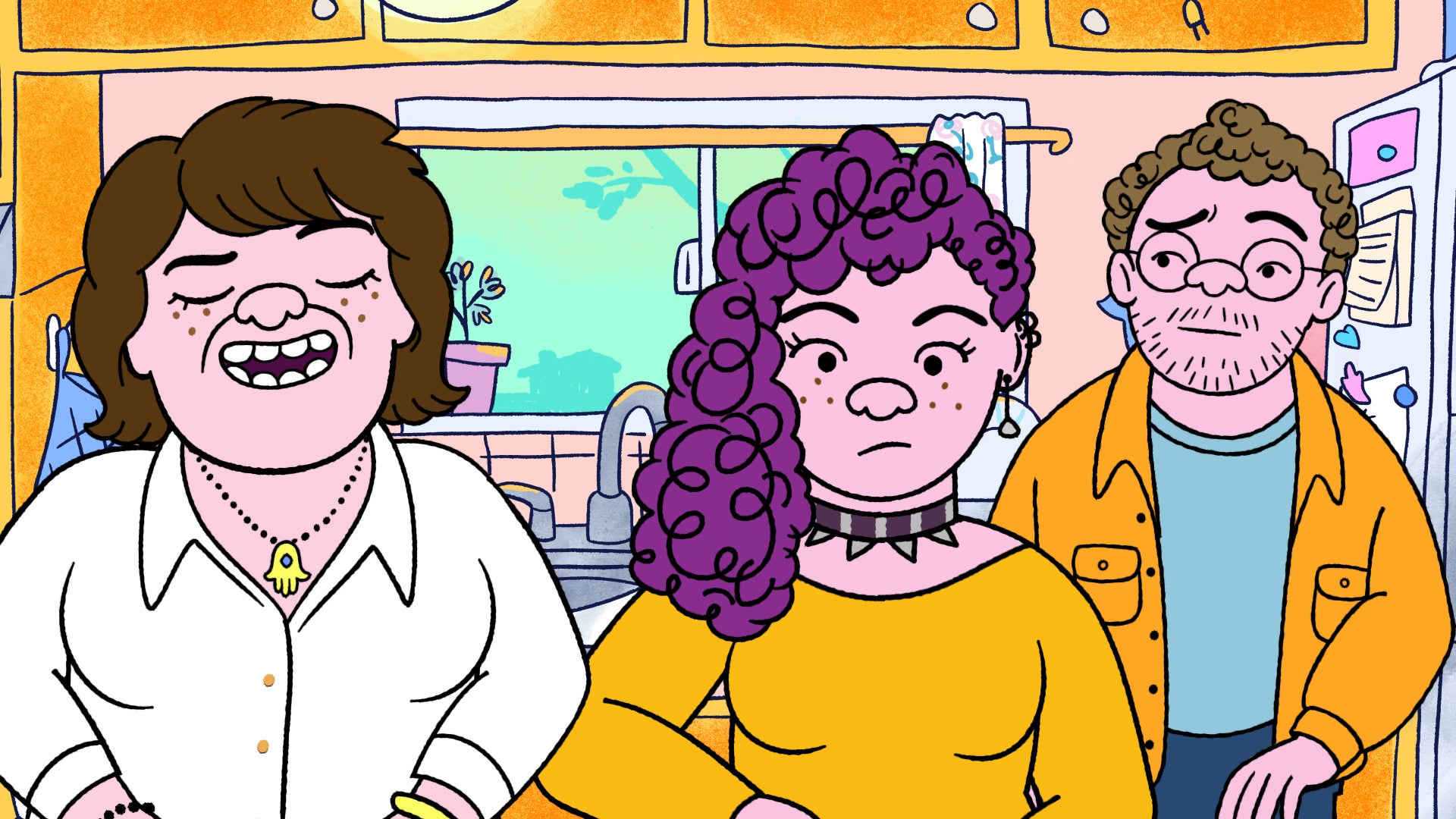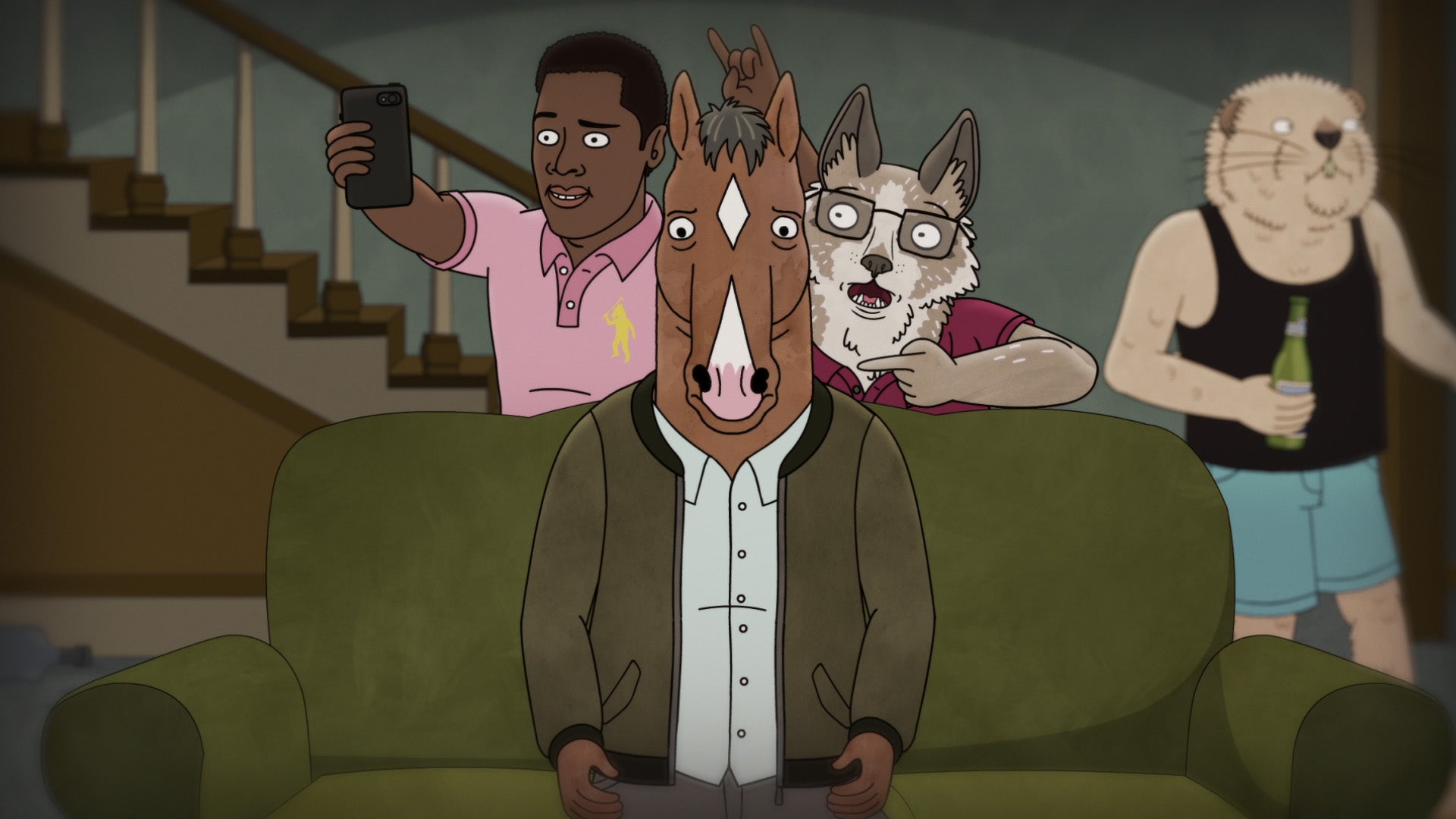Raphael Bob-Waksberg knows how to tell a joke. This comes as no surprise: the 40-year-old American writer was the creator of BoJack Horseman, one of the funniest TV shows in recent memory. The Emmy-nominated Netflix animation ran for six seasons between 2014 and 2020, and was crammed with jokes – visual gags, Hollywood satire, ornate wordplay – and cut with raw, human pathos. His favourite joke, however, Bob-Waksberg inherited from his father.
A Nazi, he begins, is driving down the street. “And when I say Nazi, I mean an actual, classic, German Nazi. The whole shtick. The sort of guy who would murder me for saying the word ‘shtick’.” Bob-Waksberg, dressed casually in a checked shirt and baseball cap, is getting into the setup, gesticulating. “Anyway, this Nazi is driving down the street and he sees a Jew with a long beard and the hat. He rolls down his window and says: ‘You, Jew! Who is the enemy of the German people?’ And the Jew knows the answer, so he goes: ‘The Jews and the bicycle riders.’” He pulls a puzzled expression. “The Nazi says: ‘Why the bicycle riders?’ And the Jew says: ‘WHY THE JEWS?’”
I laugh. Bob-Waksberg smiles shrewdly. This particular joke, he says, explains something fundamental about his comic sensibility. BoJack was, on one level, a daffy comedy about a washed-up TV star who happens to be an anthropomorphic horse. But it was also deeply sincere – a Sopranos-influenced character study of its depressed, substance-abusing antihero. Bob-Waksberg’s new animated series Long Story Short, is a very different sort of show, but one that’s similarly concerned with finding light in the dark (or vice versa). “What I love about that joke is, first of all, I think it’s funny,” he says, speaking today from Los Angeles. “I think it plays with expectations, but I also think there’s real pain there. A lot of what I think the best comedy is, and a lot of the comedy that I write, comes from pain. It is an intermingling of humour and sadness and real cathartic laughter, and I hope this show can be that for some people.”
Long Story Short, out this week on Netflix, follows the Schwooper family through several decades, jumping back and forth in time as three siblings (voiced by Mad Men’s Ben Feldman, Broad City’s Abbi Jacobson and New Girl’s Max Greenfield) endure all the triumphs, failures and in-betweens that growing up and getting older throws at them. Like the Schwoopers, Bob-Waksberg was raised in California, in a middle-class Jewish family whose surname is an amalgamation of two names (in the show, it’s the Schwarzs and the Coopers). It would be easy to assume the series is autobiographical – but that’s not quite the case.
“It’s not my family story, or my experiences necessarily, but it is personal,” says Bob-Waksberg. “The reason the family is Jewish is I felt like I didn’t have enough to say about Episcopalians to make an interesting television programme! I don’t know if I can quantify that it’s 22 per cent autobiographical, or what that number would be, but I would say it’s the appropriate amount that I wasn’t scared to show it to my family.”
Bob-Waksberg grew up deeply immersed in the Jewish community of Palo Alto: his father worked to help Russian-speaking Jews emigrate to the United States, while his mother and grandmother ran a shop named Bob & Bob Fine Jewish Gifts and Books. The characters in Long Story Short have complicated feelings about their similar upbringings. In one episode, eldest sibling Avi, a music journalist who seems closest to the show’s Bob-Waksberg stand-in, complains that constantly being taught about the Holocaust and that everyone wants to kill you doesn’t make for well-adjusted people. As his sister pushes back, he argues: “It’s not even true. Most people aren’t even thinking about us.”
In 2025, with evidence of rising antisemitism across the political spectrum, I ask Bob-Waksberg whether he was concerned about treading on such sensitive territory. “It’s always a fraught time to be Jewish,” he responds. “That doesn’t scare me away from having Jews talking about being Jewish, or the different feelings they might have about it, or the ways they see themselves fitting in to the world.”
I start to move on, but he pulls me up. “I’m sorry, I’m still thinking about that last question,” he says. “It is a question I struggle with, in a way that I think is important to struggle with. Sometimes I feel like, yes, Jews think people are thinking about us much more than they actually are. Sometimes things that I assume are antisemitic or exclusionary are not about me at all. The pendulum also goes the other way and I can perhaps give antisemites the benefit of the doubt more than they deserve. If a guy is shouting ‘Death to all Jews’ you don’t want to say:, ‘Well, we don't know his story.’ The show itself is not necessarily making a statement on one side or the other, but it is at that moment poking at that scab a little bit, intentionally.”
We as a country, we as a world, have just gone through this traumatic event and it feels like we’re not talking about it
This is not to say that Long Story Short is concerned only with Jewish life, any more than King of the Hill is a show only of interest to those with family in the Texan propane industry. It’s a sharp, frequently hilarious and big-hearted show that manages to balance laughs with profound insight about life, death and generational trauma. In one storyline, a character dies during a Covid lockdown and the family is unable to be there to properly grieve for them.
“We as a country, we as a world, have just gone through this traumatic event and it feels like we’re not talking about it,” says Bob-Waksberg. “I understand the importance in moving forward, but I don’t want to forget about this thing that happened to us. A lot of people died, and it feels necessary to create some monuments to that. I liked the idea of a show that is not all about Covid, and not all about death, but that could acknowledge that it is a part of the makeup of these characters, because it’s part of the makeup of every person who is alive right now.”
Grief, he jokes, is “universal – and hilarious”. In conversation, Bob-Waksberg has a keen knack for spotting a punchline – but took his time to realise he wanted to write comedy for a living. “I think everyone around me knew it before I did,” he says. “I was always a bit of a class clown and a performer.” He studied playwriting at Bard College in New York and toyed with the idea of being a teacher, a stand-up or a “serious playwright” before moving to Los Angeles at 25 and focusing on TV writing. He got staff jobs writing for a couple of series, but neither made it past six episodes. Then he sold BoJack, and everything changed.

“That success has defined so much of my trajectory, but it was just the fluke that it happened to be the thing I sold,” he says. “It’s funny, I’d never worked on animation before that but now I’m an ‘animation writer’.” Following the success of BoJack, Bob-Waksberg co-created the animated dramedy Undone for Amazon Prime Video – funny, again, but cerebral and mysterious – and executive produced Netflix’s madcap Tuca & Bertie, which was created by his BoJack and Long Story Short collaborator Lisa Hanawalt.
Watching BoJack, you’d never have guessed that Bob-Waksberg was learning the job of showrunner as he went along. The show earned a devoted fanbase during its run, and The Independent recently named a particularly devastating season three instalment as one of the greatest TV episodes of all time. “I have a sense now of like, ‘Oh, I think BoJack meant a lot to a lot of people’,” says Bob-Waksberg, “in a way that I wasn’t even always aware of while we were making it.”

The most important lesson that he took into Long Story Short was that audiences are prepared to go to darker and stranger places than you might expect. “The biggest risks we took almost always paid off narratively,” he says. He recalls a standalone episode in BoJack’s first season, told from the perspective of a supporting character, feline showbiz agent Princess Carolyn. “Looking back now, we went on to do much riskier stuff, but at the time I felt nervous about whether our audience would care enough,” he says. “That paid off, and it encouraged us to go to deeper places. It was scary the first time we had BoJack do an emotional monologue, or ended an episode on a sour beat, but I think working on that show gave me absolute confidence to be vulnerable, emotional and personal.”
Netflix are feeling confident too: They renewed Long Story Short for a second season before the first even premiered. It’s a show that, like BoJack, questions what it means, and what it takes, to live a good, meaningful life. For Bob-Waksberg, the success he’s achieved as a television writer is only a part of that puzzle.
“I’ve been able to make a career out of writing and I can put food on the table, and that’s nice,” he says. “I also have relationships that I am proud of – a wife and children. And I try to be kind to others.” Living a good life, though, is not, he adds, “necessarily a settled truth.. It’s a constant… I don’t want to say battle, because it’s a joy as well. It’s the project that is life.”
Long Story Short is on Netflix from 22 August
Daniel Mays calls for Stephen Graham to join The Thursday Murder Club sequels
Director of Netflix’s smash hit K-Pop Demon Hunters drops hints about sequel
Shonda Rhimes on why Bridgerton is a ‘workplace drama’ – and when it will end
Suranne Jones: How the punky soap star became one of Britain’s greatest actors
‘I learnt to dig every little thing’: Jeff Bridges on Covid, cancer and the Coens
What is fact and what is fiction in Disney’s The Twisted Tale of Amanda Knox?







